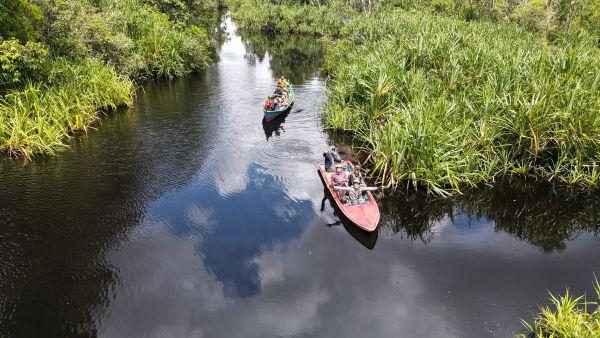Alam Sehat Lestari (ASRI)
ASRI is an NGO that began in 2007 in western Borneo in Indonesia, which co-designs solutions to key issues facing local communities and tropical rainforests.
ASRI asked community members surrounding Gunung Palung National Park what they would need in order to protect the climate-critical rainforest. The communities described key needs as healthcare, regenerative livelihood training, and conservation education.
The NGO works to conserve the biodiversity of tropical rainforests by meeting the health and economic needs of surrounding communities, in several ways.
- Medical centre: Costs are tiered according to each village’s progress toward reducing logging. Patients can pay for healthcare using tree seedlings for reforestation. Mobile clinics provide healthcare to remote communities.
Community education is provided in the clinic waiting rooms, mobile clinic waiting rooms, and in the villages. - Chainsaw Buyback Programme: Support loggers to transition to more sustainable livelihood. Chainsaws are taken and in return, provide support for the new livelihood.
- Regenerative organic farming training: This helps to end slash-and-burn agriculture and increases yields.
- Rainforest restoration: It creates wildlife corridors and buffer zones in collaboration with National Park officials and community members. Together with the Garden to Forest programme, over 277 hectares have been reforested.
- Garden to Forest programme: This supports farmers in reforesting illegal gardens. Farmers are trained in human-orangutan conflict and commit to not clearing land. In exchange, park officials legally recognise farmers’ rights to harvest fruit and non-timber forest products.
- Goats for Widows programme: It supports widows with the skills to raise goats for their long term income.
- Kids and Teens programmes: These provide after-school programs and camps about health and conservation.
In 2018 ASRI expanded to villages near Bukit Baka Bukit Raya National Park (BBBR), a 230,000 hectare rainforest in central Borneo. Its planetary health model is also being replicated by Health In Harmony, in Madagascar and Brazil.
- 2023
- Established Projects

معلومات المشروع
- Indonesian, English
- https://www.alamsehatlestari.org/
- https://www.facebook.com/AlamSehatLestari/
- https://twitter.com/yayasanasri
- febri@alamsehatlestari.org
- Jalan Sungai Mengkuang Sukadana Kayong Utara, West Kalimantan 78852 Indonesia